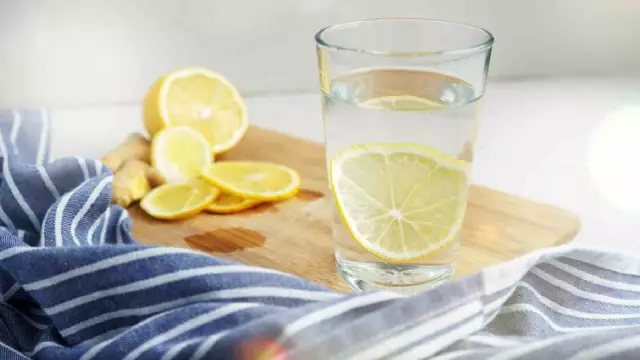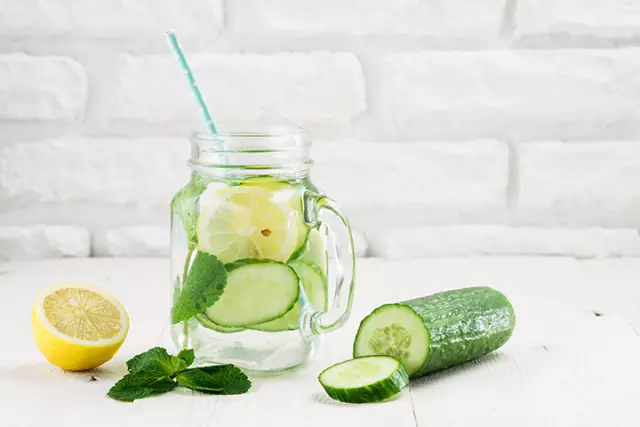- Author Rachel Wainwright wainwright@abchealthonline.com.
- Public 2023-12-15 07:39.
- Last modified 2025-11-02 20:14.
Lemon herb
Lemon grass (lemongrass, cymbopogon) is a fast-growing perennial plant, reaching a height of one and a half meters, belonging to the family of bluegrass or cereals. The plant grows in China, India, America, Southern Europe, Africa.

In tropical climates, the plant can reach a height of 1.8 meters, in colder regions it grows no more than 1 meter. The plant is sun-loving, but it can grow well in places with light shade, it is afraid of cold weather. It grows best on sandy soil, is moisture-loving, so it can often be found in swampy areas. Lemon grass has a powerful root system that quickly depletes the soil. Leaves are narrow, long, light green. It does not spread over the site, it grows in a bundle. The plant is grown in gardens, greenhouses, pots as an ornamental plant.
The plant has a citrus flavor and a light lemon scent. This smell scares away insects from him, especially mosquitoes. Thus, if lemon grass juice is applied to human skin, then mosquito protection is guaranteed for several hours.
There are two types of lemon grass - East Indian and West Indian.
The East Indian plant species comes from eastern India, and the West Indian, (or Malabar) herb comes from Sri Lanka, Burma, Thailand, Cambodia.
Both types of herb have similar properties, and the use of lemon grass is common in traditional medicine and Ayurveda. But the East Indian herb is used more in cooking.
Lemongrass composition
The main element of lemongrass is citral, the share of which is 70-85% in essential oil. The remaining 15-30% is farnesol, geraniol, citronellol, myrcene with aldehydes and other elements. The plant contains a large amount of ascorbic acid and vitamin A, iron, calcium and phosphorus.
The steam distillation method produces an essential oil from lemon grass, which is widely used as a pesticide in candles and insect repellent lamps. In addition, oil also protects palm leaves from destruction, which is successfully used in the storage of ancient manuscripts written on palm leaves.
Properties and uses of lemon grass
Lemon grass is a powerful antiseptic, has pronounced disinfectant and anti-inflammatory properties, treats respiratory diseases, tones and refreshes, helps with muscle pain, dizziness, depression, weakness, nausea, stimulates metabolism, blood circulation, heals skin diseases, cellulite, acne, removes excess sweat and fat.
The use of lemon grass has an anti-inflammatory, antifungal, tonic, antiseptic, soothing, astringent, deodorant, antioxidant, carminative, astringent, analgesic, healing effect on the body.
In folk medicine, the properties of lemon grass are successfully used in the following cases:
- With muscle pain;
- As a food additive to activate metabolism and digestion;
- For lymphatic drainage;
- In order to improve blood circulation;
- With hypotension;
- With weakness and dizziness;
- As an antidepressant for insomnia and stress;
- For the prevention of varicose veins;
- With increased sweating;
- With a runny nose, sinusitis, sinusitis and other diseases of the respiratory tract;
- With gastroenteritis and colitis;
- To remove toxins from the body, cleanse the kidneys, liver, intestines and pancreas;
- To reduce fever in infectious diseases;
- For the treatment of head lice, acne and skin diseases;
- As an aphrodisiac;
- To improve lactation;
- As an anticarcinogenic agent;
- To lower blood cholesterol.
In addition, the use of lemon grass helps to strengthen muscles, ligaments and connective tissue, increases the intensity of blood circulation in the tissues, increases the body's endurance, strengthens muscles and ligaments. Lemon grass is an excellent exercise aid and can help you lose weight.

In cosmetology, lemon grass has found application as a remedy for the care of normal and oily skin. It perfectly removes excess oil, evens out skin tone, brightens and shrinks pores, strengthens skin elasticity, tightens it.
It is used for fungal diseases of the feet and with excessive sweating, for the speedy healing of cuts, wounds and ulcers.
Essential oil of lemon grass is added to the composition of base oils, and is used for therapeutic, sports and general massage. It is used for hair care as it reduces oiliness.
Essential oil is widely used in aromatherapy. It has a psycho-emotional, therapeutic effect on the body: relieves fatigue, tones and refreshes, improves memory, stimulates potency, and eliminates headaches.
Contraindications
Lemon oil is not recommended for people with severe hypertension, hyperexcitability. In addition, lemon grass can cause mild sore throat, short-term hoarseness, and contraction of the vocal cords.
Although the plant is not toxic, if the concentration is too high, it can irritate sensitive skin, redness and burning sensation.
YouTube video related to the article:
Found a mistake in the text? Select it and press Ctrl + Enter.






